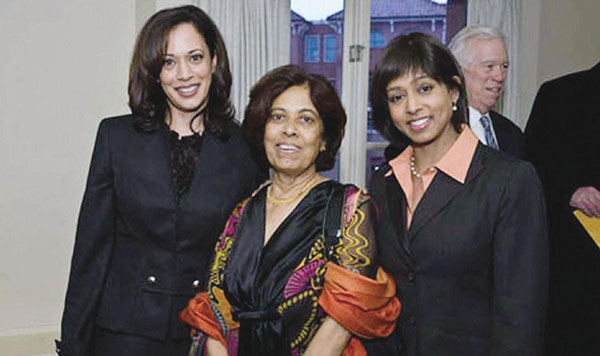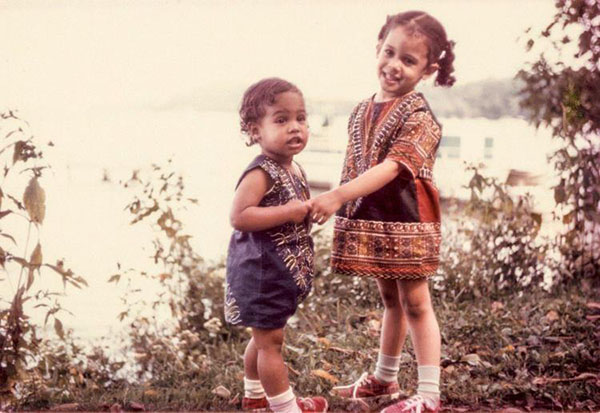Dreams from her mother: How Shyamala Gopalan prepared Kamala Harris for the White House – By Sunil Adam

Shyamala Gopalan Harris, center, with her daughters Kamala and Maya.
Source:India Abroad
Kamala Devi Harris, who announced her candidacy on Martin Luther King Jr. Day, has a long road to travel in her bid to oust Donald Trump from the White House. First, she has to overcome a posse of heavy weights in the Democratic Party to be the nominee — there are a number of declared and potential candidates with greater name recognition and expansive resumes than the freshman Senator from California.
After that, as a petite brown-black woman, she has to confront an imposing battering ram of a man who is not only skilled at sucking every ounce of oxygen on any given platform, but who is also betting on the riding, again, the crest of paranoia about the loss of white privilege under a rapidly changing demographics of the country.
By any estimate it might seem like a long shot. But everyone agrees she would be a formidable challenger.
Harris, however, may not be thinking that far ahead. She just concluded a book tour to promote her memoir, “The Truths We Hold: An American Journey,” as a way of introducing herself to the country where, outside of California, she is largely unknown. She’ll probably rely on what her mother, Shyamala Gopalan Harris — the source of her “foundational wisdom” — told her early in her political career: “Focus on what’s in front of you and the rest will follow.”
At this stage, Harris’s political journey seem to resemble that of Barack Obama, who too introduced himself to America with his poetic meditation on his biracial life and search for identity in his memoir “Dreams from My Father: A Story of Race and Inheritance.” While Harris, too, is biracial — father is a Jamaican-American — and was raised by single Indian mother, her life and identity seem less conflicted and more grounded than Obama’s. Thanks to the way Shyamala Gopalan nurtured her and her sister Maya.
“My mother understood very well that she was raising two black daughters. She knew that her adopted homeland would see Maya and me as black girls,” Harris writes in her memoir, alluding to the American racial reality that one-percent of blackness submerges all other identities. “She was determined to make sure we would grow into confident, proud black women,” Harris adds.
Shyamala Gopalan integrated her children into the black community not only because she herself was enveloped in Berkeley’s progressive African American society, given her involvement in Civil Rights Movement, but because in the early 1960s there were not many Indians in the U.S. to form a support network.
“In a country where she had no family, they (the black community) were her family – and she was theirs. From almost the moment she arrived from India, she chose and was welcomed to and enveloped in the black community. It was the foundation of her new American life,” Harris writes.
Unlike Obama, who, because of the circumstances of his childhood – living with his Hawaii-based grandparents and stints with his mother Ann Dunham in Indonesia — didn’t have much exposure to the black community till he went to college, Harris had a more balanced multi-cultural upbringing.
When this correspondent interviewed her in 2003 at her Oakland, Calif., home when Harris was running for San Francisco District Attorney, Shyamala Gopalan described how Kamala and Maya were just a couple of Indian kids at home, with their fondness for Indian clothes and food, particularly idli, vada, sambar being Kamala’s favorites.

Apart from periodic visits to her grandparents, uncles and aunts in Tamil Nadu, Harris was rooted in Indian culture all through her childhood. In her memoir, she writes: “My mother, grandparents, aunts and uncle instilled us with pride in our South Asian roots … we were raised with a strong awareness of and appreciation for Indian culture. All of my mother’s words of affection or frustration came out in her mother tongue (Tamil) – which seems fitting to me, since the purity of those emotions is what I associate with my mother most of all.”
But Harris owes her mother a lot more than multicultural upbringing and conferring an unapologetic sense of identity. She inherits from her mother audacious idealism, purpose and ambition. In that respect, Harris has considerable pedigree. Her maternal grandfather was deeply involved in India’s movement against colonial rule, tutored as he was in British liberalism, which was peculiar to his generation of Indians fighting the British. And Harris credits her maternal grandmother for the crusading civic spirit that both her mother and she inherited.

When Harris writes in her memoir, “there is no title or honor on earth I’ll treasure more than to say I am Shyamala Gopalan Harris’s daughter. That is the truth I hold dearest of all,” she is referring to the courage of 19-year-old Indian girl who moved to America for studies, at a time when it was mostly unheard of; who defied all her traditions and culture to marry a black man and had the courage to walk out of it with two small children when it didn’t work out.
While Harris’ father, Donald Harris, who teaches economics at Stanford, was involved in his children’s lives, it was her mother who was central figure. “It was really my mother who took charge of our upbringing. She was the one most responsible for shaping us into the women we would become,” she writes.
Shyamala Gopalan raised her children to believe that “It’s too hard!” was never an acceptable excuse, and “that being a good person meant standing for something larger than yourself; that success is measured in part by what you help others achieve and accomplish.” Most of all, Harris says her mother instilled in her that she should always fight “systems in a way that causes them to be fairer, and don’t be limited by what has always been.”
Harris writes poignantly about her “anticipatory grief” watching her mother’s ironic battle with cancer – she was a prominent breast cancer researcher herself – which ultimately consumed her. She enjoins her mother’s struggle with cancer with the larger issue of healthcare crisis in America, which she intends to make it a central feature of her presidential platform. “As I continue the battle for a better health care system, I do so in her name,” Harris wrote recently in a New York Times op-ed.

Kamala Harris with her younger sister Maya.
After Shyamala Gopalan’s death in 2009, an obituary in San Francisco Chronicle said: “Despite her 5-ft stature, hers was a commanding presence characterized by a sharp wit, keen sense of humor and endless depth of knowledge. She embodied an independent, confident and curious spirit that led her to travel alone to the U.S. as a teen; forge a career as a brilliant breast cancer researcher; join the Civil Rights Movement; introduce a generation of students of color to careers in science; and, through it all, raise two remarkable young women, by herself … Her passion for science was augmented by a fervent commitment to social justice … leading to a lifelong fight against injustice, racial discrimination and intolerance. She instilled these values in her daughters, who in turn have dedicated their lives to the pursuit of justice and equality.”
If Kamala Devi Harris were to overcome the seemingly formidable odds and manage to become the first woman and first Indian-American President of the United States, it will be in no small measure due to this tenacious, independent and idealistic woman from Tamil Nadu named Shyamala Gopalan. A culmination of “dreams from her mother.”








No Comments